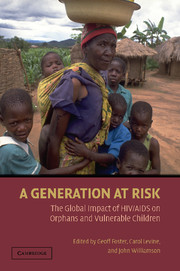Book contents
- Frontmatter
- Contents
- Foreword
- Preface
- Contributors
- Introduction: HIV/AIDS and Its Long-Term Impact on Children
- 1 Family and Community-Based Care for Children Affected by HIV/AIDS: Strengthening the Front Line Response
- 2 Strengthening Households and Communities: The Key to Reducing the Economic Impacts of HIV/AIDS on Children and Families
- 3 The Response of the Educational System to the Needs of Orphans and Children Affected by HIV/AIDS
- 4 Psychosocial Impact of the HIV/AIDS Epidemic on Children and Youth
- 5 Human Rights and Children Affected by HIV/AIDS
- 6 Religion and Responses to Orphans in Africa
- 7 Making the Right Choices in the Asia-Pacific Region: Protecting Children and Young People from HIV and Its Impacts
- 8 Troubled Tapestries: Children, Families, and the HIV/AIDS Epidemic in the United States
- 9 Interventions to Support Children Affected by HIV/AIDS: Priority Areas for Future Research
- 10 Finding a Way Forward: Reducing the Impacts of HIV/AIDS on Vulnerable Children and Families
- Chronology of Important Events
- Resource Guide
- Index
- References
3 - The Response of the Educational System to the Needs of Orphans and Children Affected by HIV/AIDS
Published online by Cambridge University Press: 05 June 2012
- Frontmatter
- Contents
- Foreword
- Preface
- Contributors
- Introduction: HIV/AIDS and Its Long-Term Impact on Children
- 1 Family and Community-Based Care for Children Affected by HIV/AIDS: Strengthening the Front Line Response
- 2 Strengthening Households and Communities: The Key to Reducing the Economic Impacts of HIV/AIDS on Children and Families
- 3 The Response of the Educational System to the Needs of Orphans and Children Affected by HIV/AIDS
- 4 Psychosocial Impact of the HIV/AIDS Epidemic on Children and Youth
- 5 Human Rights and Children Affected by HIV/AIDS
- 6 Religion and Responses to Orphans in Africa
- 7 Making the Right Choices in the Asia-Pacific Region: Protecting Children and Young People from HIV and Its Impacts
- 8 Troubled Tapestries: Children, Families, and the HIV/AIDS Epidemic in the United States
- 9 Interventions to Support Children Affected by HIV/AIDS: Priority Areas for Future Research
- 10 Finding a Way Forward: Reducing the Impacts of HIV/AIDS on Vulnerable Children and Families
- Chronology of Important Events
- Resource Guide
- Index
- References
Summary
Everyone has the right to education. Education shall be free, at least in the elementary and fundamental stages. Elementary education shall be compulsory.
– United Nations Universal Declaration of Human Rights, Art. 26, December 1948States Parties recognize the right of the child to education, and with a view to achieving this right progressively and on the basis of equal opportunity, they shall, in particular … make primary education compulsory and available free to all.
– United Nations Convention on the Rights of the Child, Art. 28, November 1989Despite international declarations asserting that children have a basic right to free elementary and fundamental education, this essential foundation for life is denied to millions of children around the world. As the international aid organization Oxfam has observed, “No human right is more systematically or extensively violated by governments than the right of their citizens to a basic education” (Watkins 2000: 1). Currently, more than 113 million children of primary school age are not in school, while as many as 150 million may not complete their primary schooling, dropping out before they have achieved sustainable mastery of basic literacy, numeracy, and social competencies (World Bank 2002). Moreover, in a disastrous feminization of illiteracy, two-thirds of those not attending school or dropping out early are girls.
Vacillating political commitment, inadequate vision, and lack of financial resources have helped create this situation, but over the past two decades the HIV/AIDS pandemic has played a major role in sustaining it.
- Type
- Chapter
- Information
- A Generation at RiskThe Global Impact of HIV/AIDS on Orphans and Vulnerable Children, pp. 66 - 92Publisher: Cambridge University PressPrint publication year: 2005
References
- 2
- Cited by



